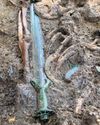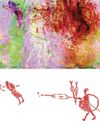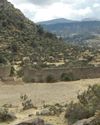Archaeology Magazine - September/October 2023

Archaeology Magazine - September/October 2023

Go Unlimited with Magzter GOLD
Read Archaeology along with 9,000+ other magazines & newspapers with just one subscription View catalog
1 Month $9.99
1 Year$99.99 $49.99
$4/month
Subscribe only to Archaeology
1 Year$29.94 $9.99
Buy this issue $4.99
In this issue
Learn how people throughout the ancient world adopted lions as sacred symbols of power and protection. Travel to northern Ukraine, where archaeologists are unearthing the remnants of a Cossack capital that the Russian czar Peter the Great burned to the ground in 1708. Take a virtual peek beneath an Egyptian mummy’s wrappings with researchers using state-of-the-art CT scanning technology. And journey with us to the slopes of Mount Vesuvius, where survivors of the devastating A.D. 79 eruption rebuilt their lives in lavish fashion. In these stories—and so many more—this issue of ARCHAEOLOGY brings the past to life.
NOSE TO TAIL
Los Angeles' first Chinatown was settled starting around 1880, south of the city's historic center, the Los Angeles Plaza. Over the next two decades, the densely populated neighborhood expanded to the northeast and became home to a range of Chinese-owned businesses. These included markets that sold fare such as plum sauce for seasoning roast meat and restaurants that served up delicacies such as bird's nest soup and century eggs.

3 mins
THE ELEPHANT AND THE BUDDHA
While working in the village of Gada Balabhadrapur on the banks of the Daya River in India's state of Odisha, archaeologists unearthed a three-foot-tall sculpture of an elephant dating to the third century B.C., a time when Buddhism flourished in the area.

1 min
RAM HEADS FOR RAMESSES
While exploring the surroundings of the temple of the pharaoh Ramesses II (reigned ca. 1279-1213 B.C.) in the ancient Egyptian city of Abydos, archaeologists from New York University's Institute for the Study of the Ancient World uncovered an enormous collection of mummified animal heads in an ancient storage area.

1 min
SUNKEN CARGO
Israel Antiquities Authority (IAA) archaeologists have begun to investigate 44 tons of marble building materials that a swimmer spotted in shallow water 600 feet off the coast of the ancient Roman port of Caesarea after they were exposed by a recent storm.

1 min
A Sword for the Ages
A zigzag pattern, now tinged with the green-blue patina of oxidized metal, adorns the octagonal hilt of a rare sword dating to the Middle Bronze Age in Germany (1600-1200 B.C.) that was recently excavated in the Bavarian town of Nördlingen.

1 min
ROYAL WHARF
During excavations in Oslo's Bjørvika neighborhood, archaeologists have uncovered a portion of the foundations of a medieval wharf.

1 min
A Very Close Encounter
New research has shown that human figures painted in red on a rock art panel in central Montana depict individuals engaged in a life-or-death encounter during an especially fraught historical moment.

1 min
PIZZA! PIZZA?
When Pompeian authorities recently unveiled a new wall painting, it launched an international debate.

1 min
PREVENTING THE RETURN OF THE DEAD
An archaeological team excavating a necropolis at the site of Sagalassos in southwest Turkey uncovered an unusual and very eerie tomb.

1 min
DRAMATIC ENTRANCE
Four miniature terracotta masks found in the Roman city of Jerash in Jordan shed light on its theater district in the second century A.D. Excavators from the University of Jordan unearthed the masks in a doorway of a structure.

1 min
A MORE COMFORTABLE RIDE
Although the date is much debated, most scholars believe people 5,000 years ago. For thousands of years after that, they did so without saddles. \"In comparison with horse riding, the development of saddles began relatively late, when riders began to care more about comfort and safety in addition to the horse's health,\" says University of Zurich archaeologist Patrick Wertmann.

1 min
LAPAKAHI VILLAGE, HAWAII
Standing beside a cove on the northwest coast of the island of Hawaii, the fishing village of Lapakahi, which is surrounded by black lava stone walls, was once home to generations of fishers and farmers known throughout the archipelago for their mastery of la'au lapa'au, or the practice of traditional Hawaiian medicine. \"

2 mins
UKRAINE'S LOST CAPITAL
In 1708, Peter the Great destroyed Baturyn, a bastion of Cossack independence and culture

10+ mins
When Lions Were King
Across the ancient world, people adopted the big cats as sacred symbols of power and protection

8 mins
Secrets of Egypt's Golden Boy
CT scans offer researchers a virtual look deep inside a mummy's coffin

8 mins
RITES OF REBELLION
Archaeologists unearth evidence of a 500-year-old resistance movement high in the Andes

8 mins
Archaeology Magazine Description:
Publisher: Archaeological Institute of America
Category: Culture
Language: English
Frequency: Bi-Monthly
Each issue of Archaeology offers the grit, and the magic, of archaeological discovery with an up-close view of sites around the world. Readers can look forward to the latest news, vivid storytelling, and compelling photography. Archaeology brings the human past to life.
 Cancel Anytime [ No Commitments ]
Cancel Anytime [ No Commitments ] Digital Only
Digital Only